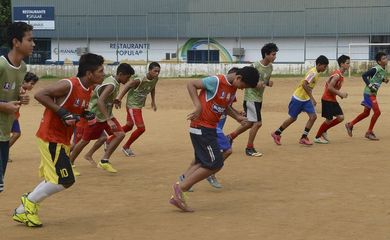Initiatives launched against child exploitation and racism in Mato Grosso


Cuiabá - Infrastructure works remain unfinished.

A month before the beginning of the World Cup, many of the infrastructure works in Cuiabá, capital city of the central-western state of Mato Grosso, remain unfinished. The city became a humongous building site, with U-turn signs everywhere to be found.
When it comes to protecting children and teenagers, in spite of the deep concern felt by authorities, there are no new investments. The city lacks the personnel and the equipment necessary to prevent human rights violations.

Cuiabá - Guardianship Councilor Flávia Cristina Carvalho and Suely Levina da Silva, chairwoman of the Municipal Council for the Rights of Children and Adolescents
Chairwoman of the local Guardianship Council Suely Silva reports that, ever since the preparations for the World Cup began, the number of sex crimes against children and teenagers skyrocketed. In 2012, 253 cases were reported. Last year, however, the number escalated to 973. “The increase was mostly seen in reports of abuse and exploitation. The number of cases also grew in the vicinity of Arena Pantanal [World Cup venue]. We’ve got three times as many reports from this period.”
Data from the federal government indicate that over 5 thousand children and adolescents have been rescued from conditions of exploitation and illegal labor in the metropolitan region of Cuiabá over the last years. Near the city’s airport, the police word on a case in which a child was forced to work in slavery-like conditions, less than three months before the international competition.
Among the solutions to the problem is the promotion of children’s access to education and sport. Cuiabá, however, still lacks leisure centers where social work projects can be conducted.

Cuiabá - The city's Sport and Youth Secretary Carlos Brito, says that the maintenance of leisure centers is a great challenge
Cuiabá’s Secretary of Sport and Youth Carlos Britto acknowledges the issue: “Unfortunately, sport is not adopted as an effective public policy. So, much of our equipment is in very poor conditions. We’re already repairing great part of it, but it’s a great challenge. For years this issue has not been among the priorities, and the equipment deteriorated as a result.”
A number of initiatives have helped keep children and adolescents in Matro Grosso away from sexual exploitation schemes and child labor. An example is a school founded a little more than a year ago, in the Mata Cavalo quilombo, 30 km away from Cuiabá. Its curriculum includes sport and African culture, an element of crucial importance to the city’s history of fight for land and freedom.

Cuiabá - Antonio Ferreira Valentim Elementary School, the new school in the quilombo community
At the new school, children from over 400 families who live in the quilombo can study a short walk away from their homes. However, things were considerably different a few years ago, says Antonio Benedito, the quilombo’s oldest resident, at the age of 109: “When the school was created, blacks weren’t allowed. It was tough, but thanks to the power of God, the blacks won the fight.”
The school boosts the self-esteem of the community. Teachers work out of love and passion for what they do. This is the case with teacher Lucilene Ferreira, who studied in São Paulo, Brasília and Rio de Janeiro before returning to the community. “Children are not ashamed to dye their face, to show their quilombola origins, their racial diversity and ethnicity. They’re not afraid of any of these things,” she says.
Before the ball starts to roll in the World Cup stadiums, the football court in the quilombo provides the stage for a number of matches. Students had not played the sport for four years, and now they carry the medals they won in the local football league. Among the stars is 9-year-old Jhonatan de Jesus. “When I grow up I want to be a football player and a doctor,” the boy says.
Translated by Fabrício Ferreira
Fonte: Initiatives launched against child exploitation and racism in Mato Grosso



